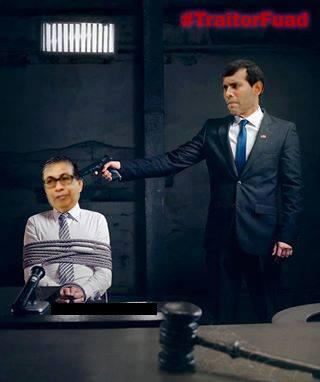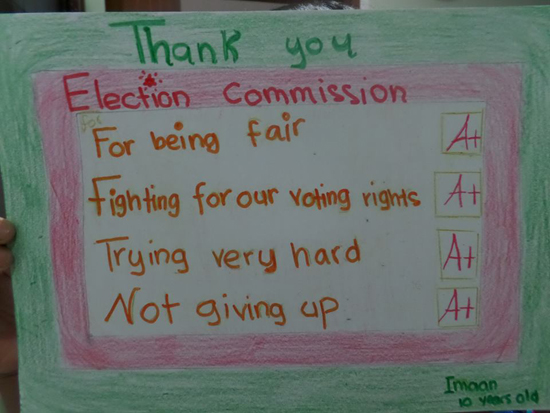The Commonwealth Observer Group who monitored the 2013 presidential polls has recommended that the People’s Majlis examine the consistency and workability of the Supreme Court’s 16-point electoral guideline.
The guideline, issued following the annulment of the September 7 first round of polls, “appeared to undermine the authority of the Election Commission, were inconsistent with or contrary to electoral law, and were at odds with the Constitution,” the Observer Group said in its final report.
The report obtained by Minivan News also condemned the Maldives Police Services’ obstruction of the October 19 presidential polls as “unacceptable.”
The Supreme Court annulled the September 7 presidential poll citing widespread electoral fraud despite international and domestic praise of a free and fair vote.
The Elections Commission (EC) has criticised the guidelines as “restrictions” that limit the power of the independent state institution. The guidelines give candidates veto over the elections as their signature is mandated on the voter registry.
The ruling Progressive Party of the Maldives (PPM) and 295 independent candidates have failed to approve the voter registry for the local council elections scheduled for Saturday. However, the EC has decided to proceed with polls.
The Commonwealth Observer Group found the 2013 presidential polls credible despite the Supreme Court’s constraints, the report said.
Guidelines
The Chairperson of the Commonwealth Observer Group Dr Lawrence Gonzi said many of the Supreme Court’s guidelines were “incompatible with existing Maldivian electoral law, and in our view, do not conform with electoral best practice.”
Several national stakeholders had told the group that the guidelines were “cumbersome and impractical.”
In international best practice, no significant changes should be made to the electoral framework six months prior to an election, the report said.
“The Group was therefore particularly concerned that the guidelines given by the court in effect changed the electoral procedures in the middle of the electoral process, creating a great deal of unnecessary uncertainty and confusion,” the report read.
If the legislative and regulatory framework governing the electoral process is to be changed, the legislature instead of the judiciary must undertake the task, the report said.
The group called on the Majlis to make amendments it believes necessary to the existing law to ensure all future elections are conducted “according to the proper legal framework.”
Further, the group has recommended that the mandate and the statutory constitutional independence of the EC be recognised.
Annulment
The Supreme Court’s annulment of the September 7 election and cancellation of three subsequent elections “severely tested the democratic process in the Maldives,” the report said.
The group reiterated that the first round of polls held on September 7 were “credible and consistent with the international standards to which the Maldives has committed itself.”
The report highlighted that the EC was not given access or right of response to a police forensic report based on which the Supreme Court annulled the election.
The annulment of the polls and the lack of predictability of the electoral timetable led to a deterioration of the “largely positive political environment observed in early September” while political parties reported a negative effect on their ability to campaign, the report said.
It also noted that EC members and staff were subject to death threats and verbal harassment over alleged vote fraud.
Voter registry
In the Supreme Court verdict, four of the seven judges invalidated 5,623 votes claiming they were repeated votes, votes cast by dead people, and votes cast by people who had discrepancies in their names and addresses.
The court then ordered the EC to discard its registry and rely on the Home Ministry’s Department of National Registration (DNR) to compile a new voter registry.
However, the Commonwealth Observer Group has praised the EC’s voter registry noting that the EC “took steps to ensure accuracy of information and transparency in the administration of the process.”
The EC had engaged the electorate, providing two periods for verification of information and amendments, the report said.
Furthermore, “fears expressed by some political parties regarding possible large numbers of deceased voters remaining on the list and voters registered in the wrong geographic area seem to be unfounded,” the report added.
The group has recommended that the EC maintain a separate voter registry and said that it “should have sole responsibility for, and be empowered to ensure, the credibility and accuracy of that register in accordance with the 2008 constitution of the Maldives.”
The report said the group was consistently “impressed by the enduring commitment of the Maldivian people to the democratic process, who on each occasion have turned out to vote in very high numbers.”
Further, the group said it is “impressed by the professionalism of the Elections Commission and its staff, who have shown a great determination to fulfill their mandate in extremely challenging circumstances.”
Former President Mohamed Nasheed has meanwhile warned of collusion between the ruling Progressive Party of the Maldives (PPM) and the Supreme Court to subvert the local council elections.
“We clearly know political party leaders are bribing judges,” said Nasheed, stating that the Supreme Court’s attempt to “steal elections” and “destroy the Maldives” will be written in history.

